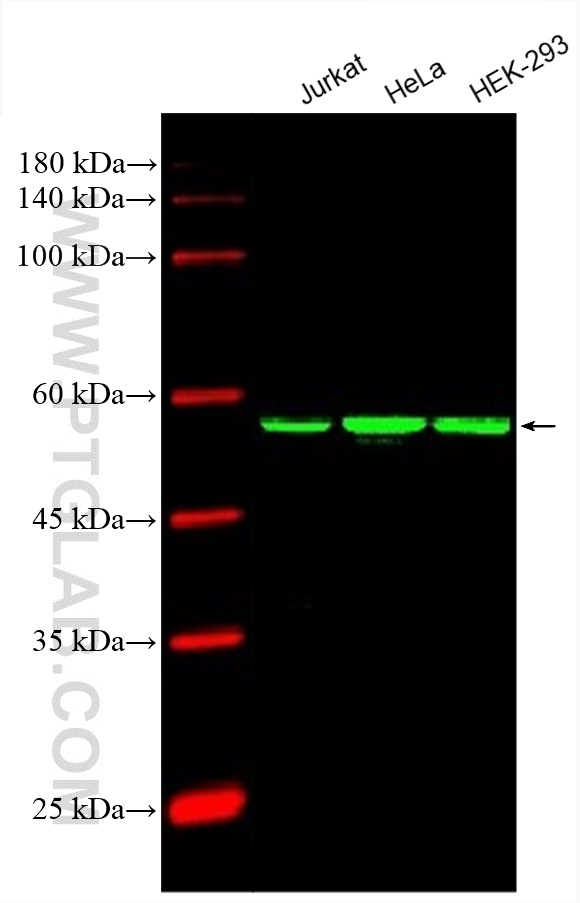验证数据展示
经过测试的应用
| Positive WB detected in | Jurkat cells, HeLa cells, HEK-293 cells |
推荐稀释比
| 应用 | 推荐稀释比 |
|---|---|
| Western Blot (WB) | WB : 1:500-1:1000 |
| It is recommended that this reagent should be titrated in each testing system to obtain optimal results. | |
| Sample-dependent, Check data in validation data gallery. | |
产品信息
CL488-66100 targets PDCD4 in WB applications and shows reactivity with human samples.
| 经测试应用 | WB Application Description |
| 经测试反应性 | human |
| 免疫原 |
CatNo: Ag19239 Product name: Recombinant human PDCD4 protein Source: e coli.-derived, PET28a Tag: 6*His Domain: 169-469 aa of BC026104 Sequence: TPIIQEYFEHGDTNEVAEMLRDLNLGEMKSGVPVLAVSLALEGKASHREMTSKLLSDLCGTVMSTTDVEKSFDKLLKDLPELALDTPRAPQLVGQFIARAVGDGILCNTYIDSYKGTVDCVQARAALDKATVLLSMSKGGKRKDSVWGSGGGQQSVNHLVKEIDMLLKEYLLSGDISEAEHCLKELEVPHFHHELVYEAIIMVLESTGESTFKMILDLLKSLWKSSTITVDQMKRGYERIYNEIPDINLDVPHSYSVLERFVEECFQAGIISKQLRDLCPSRGRKRFVSEGDGGRLKPESY 种属同源性预测 |
| 宿主/亚型 | Mouse / IgG1 |
| 抗体类别 | Monoclonal |
| 产品类型 | Antibody |
| 全称 | programmed cell death 4 (neoplastic transformation inhibitor) |
| 别名 | H731, Nuclear antigen H731 like, PDCD4, Protein 197/15a |
| 计算分子量 | 469 aa, 52 kDa |
| 观测分子量 | 56 kDa |
| GenBank蛋白编号 | BC026104 |
| 基因名称 | PDCD4 |
| Gene ID (NCBI) | 27250 |
| RRID | AB_3084205 |
| 偶联类型 | CoraLite® Plus 488 Fluorescent Dye |
| 最大激发/发射波长 | 493 nm / 522 nm |
| 形式 | Liquid |
| 纯化方式 | Protein G purification |
| UNIPROT ID | Q53EL6 |
| 储存缓冲液 | PBS with 50% glycerol, 0.05% Proclin300, 0.5% BSA, pH 7.3. |
| 储存条件 | Store at -20°C. Avoid exposure to light. Stable for one year after shipment. Aliquoting is unnecessary for -20oC storage. |
背景介绍
Programmed cell death 4 (Pdcd4) is a novel tumor suppressor that inhibits translation, progression and invasion. It was first identified as being differnetially upregulated during apoptosis. Pdcd4 interferes with the activity of the eukaryotic initiation factor (eIF) 4A by displacing the scaffold protein eIF4G from its binding to the RNA helicase eIF4A.
实验方案
| Product Specific Protocols | |
|---|---|
| WB protocol for CL Plus 488 PDCD4 antibody CL488-66100 | Download protocol |
| Standard Protocols | |
|---|---|
| Click here to view our Standard Protocols |


